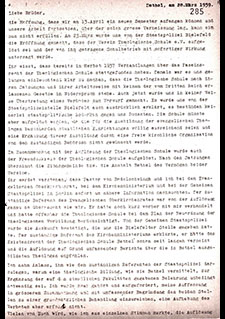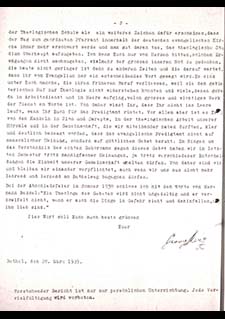The Closing of the School of Theology in Bethel
Friedrich von Bodelschwingh, Sr. had founded the “School of Theology” in Bethel in 1905 as a center of theological training beyond the state academic schools of theology. From 1933 to 1939, it was characterized by different phases, by no means only critical toward state, and by different theological and political value systems.
On average, 134 to 200 students attended the School of Theology from 1932 to 1939. More and more frequently they were advanced students, especially advanced students from the Confessing Church preparing for their exam. Nonetheless, Friedrich von Bodelschwingh, Jr. avoided explicitly declaring the school an educational institution of the Confessing Church.
The Gestapo closed down the School of Theology in March of 1939. Its closing was officially justified with the “Emergency Decree for the Protection of the People and State” of February 28, 1933 (“Reichstag Fire Decree”), which served to eliminate people and institutions that that stood in the way of the Nazi’s policy of Gleichschaltung. The real reason for its closing was probably the close ties of parts of the School of Theology to the Confessing Church though.
Neither the protest in the form of a pulpit announcement expected by Nazi authorities nor the popular unrest feared ever materialized. Five days after the school had been closed down, its director, Dr. Georg Merz (1892–1959), wrote a personal letter to the Friends of the Association of Schools of Theology and the students already enrolled for the next semester. Merz related the reasons for the closing cited by officials and his futile efforts to move the Gestapo and Reich Ministry of Church Affairs to rescind the measure.
Above all however, Merz admonished the students to continue studying theology elsewhere, stressing that Protestant ministry is based not on human opinion, but on God’s commandment. Merz’s pastoral formulations addressed to the students included an indirect criticism of the Nazis’ obstruction of theologians’ education without explicitly attacking the Nazi state.
Source / title
- © LAMS Oberpräsidium 5018, Bl. 285f.


